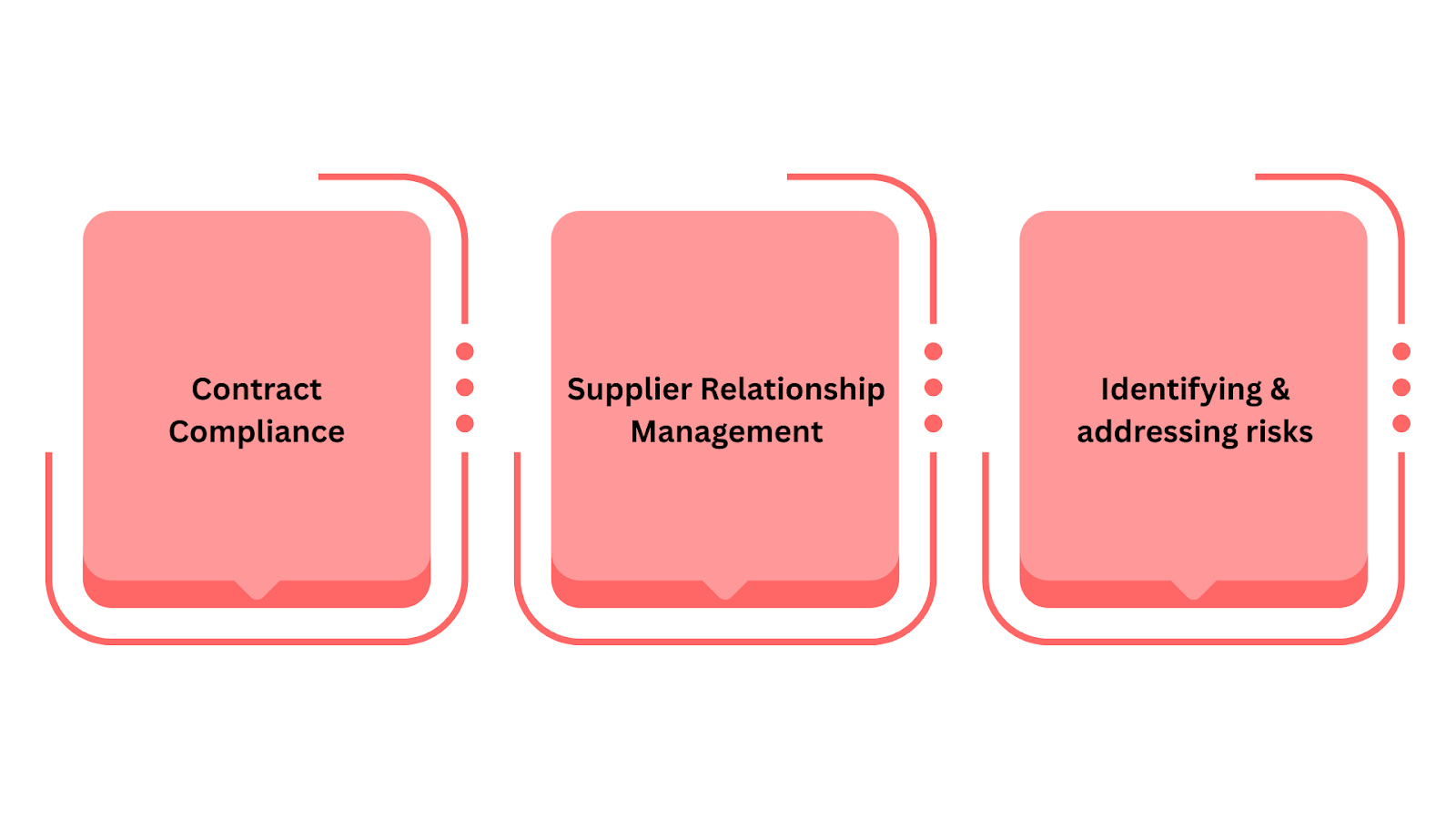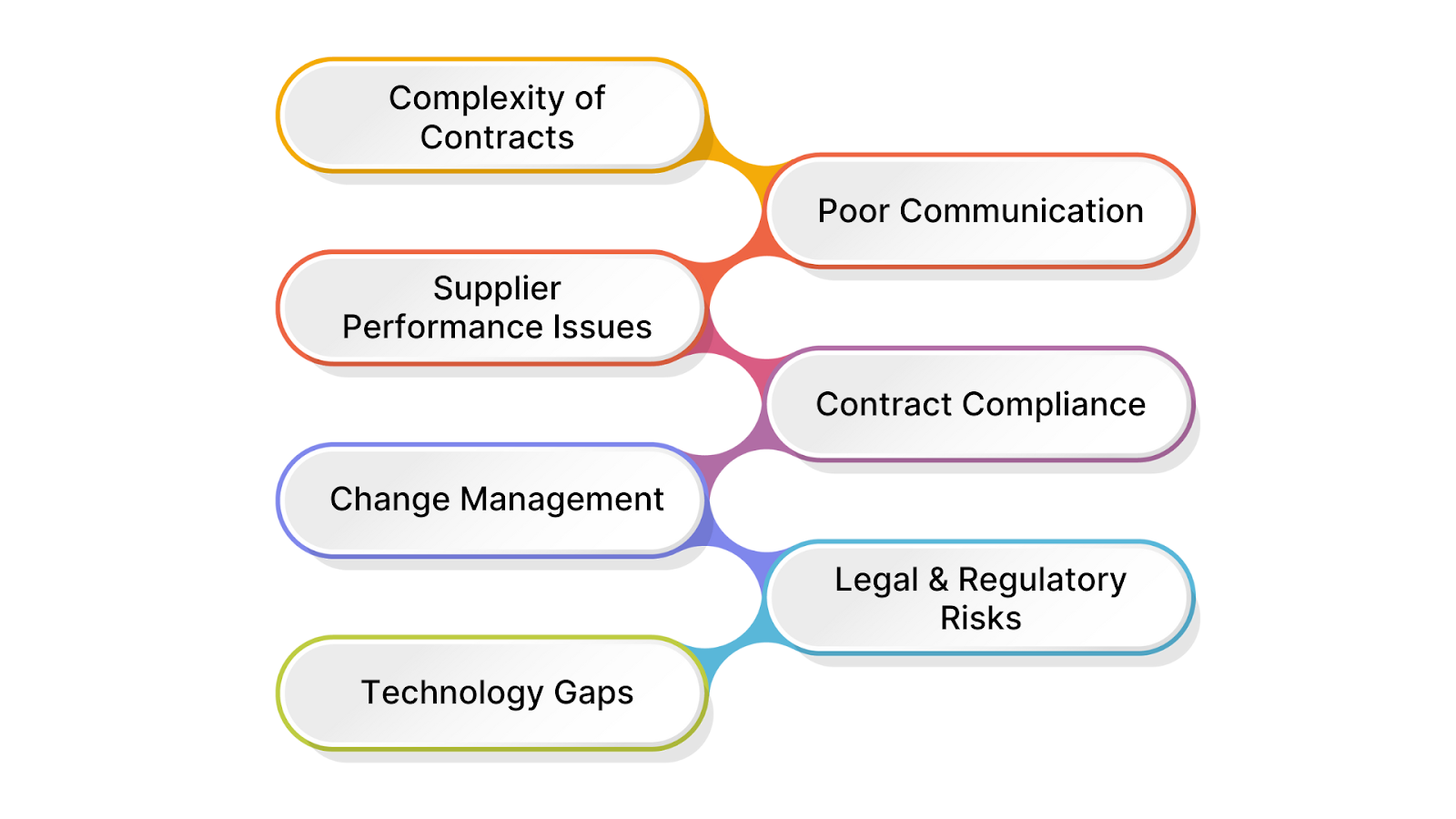
Procurement contract management is a fundamental aspect of both construction and business operations, forming the backbone of successful project execution. Effective contract management ensures that projects are delivered on time, within budget, and according to the specified quality standards. With major investments driven by Vision 2030, procurement contracts in Saudi Arabia must adhere to local legal frameworks, including Ministry of Commerce regulations and industry compliance standards set by SAMA.
In Saudi Arabia, where the construction industry is growing quickly because of Vision 2030, research shows that following procurement contract terms greatly improves how well projects perform. For instance, compliance with these terms received an average score of 4.10 out of 5 in government construction projects, showing that people highly value its importance.
This blog will look at the usual problems that come up in managing procurement contracts and offer real solutions to help overcome these issues, leading to better contract management and more successful project results.
Procurement contract management is about handling agreements with suppliers and vendors during the entire project. The process starts with creating the contract, then moving on to signing it, and finally ending the contract properly. The goal of procurement contract management is to make sure both parties do what they're supposed to, get the expected results, and avoid possible problems.
Key objectives of procurement contract management include:



While procurement contract management is essential to the success of any project, it’s not without its challenges. These obstacles can cause delays, disputes, and financial losses if not appropriately addressed.
Let’s take a deeper look at the most common issues faced by procurement teams and project managers, and how they can be resolved.
Construction agreements involving big jobs usually have many specific rules and details. Contracts may contain elements concerning performance standards, fines for lateness, repayment dates, deadlines, outputs, and additional technical details.
Saudi construction and business contracts frequently incorporate requirements from the Ministry of Commerce and SAMA, ensuring all procurement activities are legally binding and fully compliant with Kingdom-wide regulatory frameworks.
For instance, a contractor could miss delivering materials if there's no clear agreement about when they should be handed over, causing delays in building projects and making the owner pay more money.
Solution: Simplify contracts by using clear, unambiguous language. Involve legal teams in the drafting process to ensure that contracts are both comprehensive and easy to understand. Regularly review contracts to ensure they reflect the current project scope and goals.
To further tackle the complexity of construction contracts, HAL offers advanced contract management features that centralize contract data, automate clause tracking, and monitor timelines and deliverables in real-time. HAL’s platform ensures no critical contract details are overlooked by providing dashboards and alerts that streamline compliance monitoring.
Miscommunication between procurement teams, suppliers, and stakeholders is a leading cause of delays and conflicts in procurement contract management. A lack of regular updates or clarity on expectations can lead to misunderstandings regarding project requirements, timelines, payment schedules, and even quality standards.
Example: A supplier might misinterpret the delivery schedule or specifications, resulting in delays or the incorrect delivery of products, which could halt the entire project.
Solution: Establish regular communication channels, such as weekly meetings, collaborative platforms, and project management software, to ensure all parties have access to up-to-date information. Foster a culture of transparency and open communication to prevent misunderstandings and delays.
In procurement, managing multiple suppliers with varying performance levels can be a challenging task. Suppliers may fail to meet deadlines, deliver products of subpar quality, or not adhere to the agreed-upon contractual terms. These issues can disrupt the entire project timeline, affecting quality, cost, and customer satisfaction.
For instance, a supplier could hold up the delivery of important construction materials, causing delays in the project timeline and leading to extra costs when materials have to be bought from a different supplier.
Solution: Before signing a contract, carefully check the supplier's reliability. Keep track of their performance using key performance indicators (KPIs) and maintain regular contact to address any issues promptly. Use these performance measures to identify and address problems before they escalate.
Tracking deliverables, milestones, and compliance with contract terms is an ongoing and complex process. In large-scale projects, manual tracking or disorganized documentation can lead to oversights, causing delays, disputes, and confusion over what has been delivered versus what was agreed upon in the contract.
Example: A contractor may not meet a contractual milestone, but without a proper tracking system in place, it goes unnoticed until the project is significantly delayed.
Solution: Utilize digital contract management tools to monitor compliance in real-time. These tools can track milestones, deadlines, and performance metrics, ensuring that all parties stay on track and aligned. Automated alerts and reminders for milestones and deliverables help prevent critical dates from being missed.
For instance, HAL ERP offers an integrated contract compliance module that centralises all contract information and tracks key milestones and deliverables in real-time. Its automated alerts and customizable dashboards provide proactive notifications to avoid missed deadlines and ensure contractual obligations are met.
Managing changes in scope, variations in work, and contract amendments is a frequent challenge. Change orders, whether due to new requirements, unforeseen conditions, or errors in initial planning, can affect the cost, schedule, and quality of the project. Without a structured process, these changes can lead to disputes, confusion, and delays.
Example: A contractor may request a change in project scope, but without proper documentation or approval procedures in place, it can lead to disagreements over whether the change should be executed and at what cost.
Solution: Establish formal processes for contract amendments, including a clear approval workflow and documentation. Ensure that all parties are informed of any changes and that modifications are agreed upon in writing before execution. Proper change management protocols help maintain control over the project and ensure clarity for all involved.
Navigating complex legal requirements and avoiding disputes is particularly challenging in industries such as construction, where regulations are often intricate and subject to frequent changes. Non-compliance or failure to meet legal requirements can result in costly penalties, litigation, or even project shutdowns.
Example: A failure to comply with local construction regulations regarding labor or safety standards could result in fines or stoppages, disrupting the project timeline.
Solution: Engage legal experts early in the contract drafting process to ensure compliance with local laws and industry regulations. Regularly review contracts to stay updated on changes in the legal landscape, and conduct compliance audits to mitigate potential legal risks.
Many companies still use old ways to handle procurement contracts, such as spreadsheets, email, and paper documents. These old methods can lead to mistakes, don't show real-time updates, and aren't efficient when dealing with lots of contracts.
Example: Using email to update contracts can result in missing changes, having different versions of the same contract, or losing important information, which may slow down the project.
Solution: Use contract management software that keeps all contract information in one place, automates tasks, and provides real-time updates. These systems improve accuracy and efficiency, and they also offer tools for analyzing data, helping teams make better decisions, track performance, and spot trends.
Also Read: Why Is Procurement Management Software Important for Business Growth?
Managing compliance with Saudi labor law and Saudization rules is a major challenge in procurement contract management. All employment contracts must be registered on the Qiwa platform and fully comply with local labor standards, including working hours, overtime, and leave requirements. Non-compliance can result in fines, contract delays, or even suspensions.
Additionally, meeting Saudization (Nitaqat) targets—hiring and retaining a set quota of Saudi nationals—has become a key requirement for government and large private contracts. Failure to achieve the required Saudization ratios can limit eligibility for government tenders.
Example: A construction firm bidding for a public contract faced approval delays because its Saudization ratio fell below the sector requirement, prompting urgent recruitment and compliance checks.
Solution: Digitize and regularly update labor records on Qiwa, monitor Saudization status, and assign a compliance officer to ensure all contract and workforce requirements are met.
Managing payment cycles is a significant challenge for suppliers and contractors in Saudi Arabia. Payment terms often extend from 30 days up to 180 days, especially in public sector projects and government-affiliated organizations. These long payment cycles can create cash flow constraints, making it difficult to cover operational costs, invest in growth, or pay subcontractors on time.
Example: An SME supplier delivering to a major real estate developer experienced over 100 days of payment delay, resulting in halted orders, strained payroll, and lost new contracts.
Solution: Negotiate clear payment milestones with enforceable deadlines in contracts. Use invoice financing or discounting to access working capital tied up in unpaid invoices, and employ accounting and billing software.

Saudi Arabia’s government procurement is centrally managed through the Etimad platform, which is the Kingdom’s official portal for all public contracting and tendering activities. The platform is operated under the Ministry of Finance and is designed to promote transparency, drive competition, and support digital transformation in line with Vision 2030 objectives.
Understanding Saudi Arabia’s unique business culture is essential for successful contract negotiations and relationship management. Saudi business practices are deeply rooted in respect, trust, and personal relationships, which often take precedence over formal contract details early in the process.
Key Cultural Factors
Disputes are a common challenge in procurement projects, especially when dealing with complex contracts. In Saudi Arabia, the Saudi Center for Commercial Arbitration (SCCA) plays a crucial role in efficiently resolving such disputes through arbitration and mediation services, ensuring that conflicts are handled in a Sharia-compliant manner.
Utilizing the Saudi Center for Commercial Arbitration (SCCA) ensures quick and effective resolution of procurement contract disputes in Saudi Arabia.
Key Points:

Managing procurement contracts efficiently can be complex, but HAL streamlines the entire process, making contract management easier and more effective.
Here’s how HAL simplifies procurement contract management:
By leveraging HAL, organizations can optimize their procurement contract management processes, ensuring better control, visibility, and overall project success.
Procurement contracts guide project timelines, budgets, and quality by managing resources efficiently. However, difficulties such as complexity, bad communication, problems with suppliers' performance, and payment disagreements frequently prevent achievement. Implementing clear contract drafting, regular reviews, and utilizing technology will help businesses overcome obstacles and enhance their procurement operations.
HAL ERP provides an efficient way to handle procurement agreements smoothly. Its centralised contract data, ongoing monitoring, automated workflow management, and supplier performance tracking streamline the whole procedure. With HAL ERP, companies can guarantee quick adherence, minimize hazards, and enhance successful project results.
Book a demo with HAL ERP today to streamline your procurement contract management process and experience how automation and real-time insights can enhance your project delivery and performance.
1. How does effective procurement contract management contribute to project success?
Effective procurement contract management helps ensure that projects are completed on time, within budget, and meet the required standards. It helps reduce risks, builds good relationships with suppliers, and leads to better overall results for the project.
2. What are the key challenges in procurement contract management?
Some common challenges in procurement contract management include complex contracts, unclear communication, issues with supplier performance, difficulty in following contract terms, and managing changes. If these aren't handled well, they can cause delays, increased costs, and conflicts.
3. How can I improve communication in contract management?
Maintaining regular updates, using shared platforms for teamwork, and having clear ways to exchange information help keep things open and prevent confusion. Keeping everyone on the same page throughout the project is essential.
4. Why is regular contract review important?
Reviewing contracts regularly ensures they stay in line with the project's changing needs and allows for quick updates when needed. This helps avoid disagreements and misunderstandings later on.
5. How can technology help in procurement contract management?
Using technology like contract management software can organize information in one place, automate routine tasks, and offer real-time updates. This improves efficiency, makes it easier to track progress, and reduces the chance of mistakes or missing key deadlines.